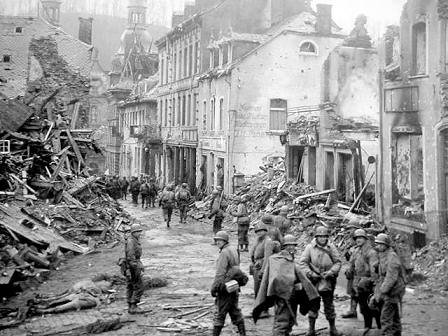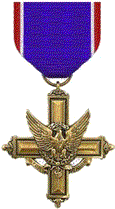
Company I, 8th Infantry Regiment, 4th Infantry Division
Through the fog that swept the Hurtgen Forest, counter-attacking German soldiers approached as swiftly and silently as wraiths.
"But," said Staff Sergt Demetrios Vlahantonis of Lowell, Mass, in an interview released by the war department in March 23, 1945, following his return from overseas on furlough, "no matter how quickly they came, they never took us by surprise."
"We had to be ready for them. It was a matter of life and death, a thing of killing or being killed. In that fighting in the Hurtgen forest I placed my main reliance on the M1 rifle, and it justified all the faith I had in it. It never let me down and it killed a good many Germans who might have killed me if I hadn't had a reliable weapon."

M1 Garand
Hardest of All
Sergt Vlahantonis, a mortar section leader in weapons platoon of an infantry division, after recalling all of the heavy fighting in which he was engaged from D-day, June 6, onward, said he believed the Hurtgen forest battles were the hardest of all.
"The weather and the terrain had a lot to do with it," he said. "It was so wet it was difficult to dig foxholes. The brush was so thick the Germans had plenty of concealment and they made the most of it. Too, most of the area was heavily mined, which made our movements precarious."
"During the two weeks it took us to clear the forest, the Germans counter-attacked incessantly. In doing our part to break up one particularly vicious counter-attack, or rather, a series of attacks launched by the Heinis, my section fired 1500 rounds in ne day, which is a lot of shooting."
"With mortar fire we flushed the Heinis into the open where the machine-gunners could get a crack at them and our machine guns simply mowed them down."
Sergt. Vlahantonis won the Bronze Star Medal for heroic achievement on D-Day. On the same day his regiment earned a unit citation, giving him the right to wear a Distinguished Unit Badge. He also has been awarded the Combat Infantry Badge for exemplary conduct in action against the enemy.
Relating his experiences on D-Day when he landed in France and the days immediately following, the tall young infantryman said:
"We landed on 'Utah Beach' and caught the Krauts with their guard down. On the beach itself there was comparatively little opposition and we moved inland quickly. Our first real trouble came that night when they counter-attacked. From that moment on it was touch and go."
"They shelled us, machine gunned us, drove in for close range fighting, and gave us no rest. We were eager for action and we fought hard. After fighting off the first counter-attack we kept going and flanked them. For three days and three nights I didn't even have time to dig a hole."
"You see, we were fighting amid those Normandy hedgerows, which not only hemmed us in, but which gave the Krauts a certain amount of concealment and protection for their movements. They were stubborn and finally their counter-attacks tapered off and we had a chance to dig in."
One of the most exciting experiences he underwent, Sergeant Vlahantonis said, occurred near Prüm, Germany, when his platoon and a 'raider' squad from another company, supported by tanks, forced their way through to our relief. When the riflemen and the tanks crashed through, they caught the 'SS' Jerries flatfooted and killed an entire company of them.

Prüm / Germany
My Hero
"For my money, the hero of that occasion was a good friend of mine, Private First Class Dale Smith, a Kansas man. At the most crucial point of the whole 24 hours he broke up a Nazi counter-attack by firing a light machine gun from under his arm, cutting Krauts down until finally the counter-attack dissolved in panic."
Sergeant Vlahantonis told how his company commander, Capt "Red Top" Marsden, whom he described as an officer "who always got us out of the toughest spots," fought his way out of an ambush:
"The Krauts ambushed the captain as he was making a reconnaissance in his jeep," the sergeant said. "the opened fire with a machine gun burst which virtually riddled the jeep, then ordered him to surrender. Instead of surrendering, he banged away at them with his carbine, which confused them momentarily, giving him time to leap into the brush. Making their way through the brush, sometimes within a couple of feet of Jerries, the captain and the two doughboys managed to get back to the company unharmed."
 MARSDEN, WILLIAM M.
MARSDEN, WILLIAM M.
Citation:
The President of the United States takes pleasure in presenting the Distinguished Service Cross to William M. Marsden, Captain (Infantry), U.S. Army, for extraordinary heroism in connection with military operations against an armed enemy while serving as Commanding Officer of Company I, 8th Infantry Regiment, 4th Infantry Division, in action against enemy forces on 1 December 1944, in Germany. During action near Duren, Germany, Captain Marsden was leading his company through a bitterly defended section of the Hurtgen Forest when they were subjected to devastating enemy artillery and mortar fire. As his men wavered in the face of the terrific fire, Captain Marsden moved forward shouting encouragement to his troops, skillfully and courageously led them around a mine field and continued the attack with accurate grenade and sub-machine gun fire, until seriously wounded. Inspired by his heroic leadership the company fought on and reduced the enemy positions. Captain Marsden's fearless, aggressive action, personal bravery and zealous devotion to duty exemplify the highest traditions of the military forces of the United States and reflect great credit upon himself, the 4th Infantry Division, and the United States Army.
Headquarters, Third U.S. Army, General Orders No. 137 (June 11, 1945)
Home Town: Crewe, Virginia

Source: The Lowell Sun, Friday March 23, 1945
